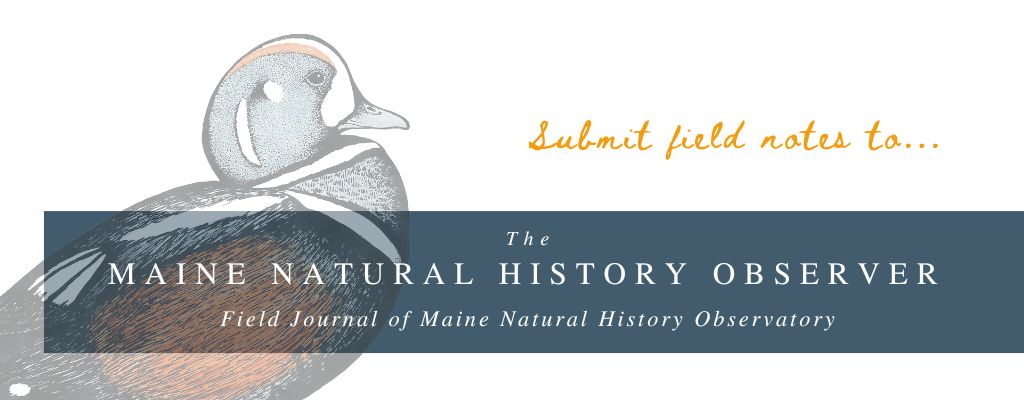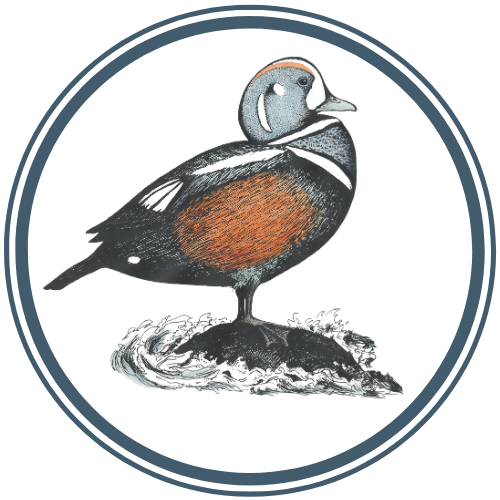Submit materials to the Observer

When to Submit Materials for the Next Observer
Anytime! The Observer is now published quarterly and Field Notes and articles are accepted on a rolling basis all year round.
Winter Issue: Materials due December 1st
Spring Issue: Materials due March 1st
Summer Issue: Materials due June 1st
Fall Issue: Materials due September 1st
How to submit materials for the Observer
- Email your materials to editor@mainenaturalhistory.org
- You may submit photos, sketches, species lists, videos, and recordings with your piece.
- In your email, please include:
- a short title for your piece
- how you want your name to appear in your byline
- let us know if you want us to include your email address with your byline. Sharing your email allows readers to contact you with questions or suggest collaborations.
- the date (or date range) of your observation(s)
- the town and county in Maine where the observation(s) took place.
Who can submit materials?
Anyone! If you’re not a current member of the Observatory, you will receive a link to each issue in which you have a piece published. If you want to receive all issues of the Observer or read the archives, you will need to subscribe by becoming an Observatory Member.
What’s the difference between Field Notes and Articles?
The difference is length and scope. You don’t need to know if your submission is an article or a field note before you send it. The journal staff will assess which section to put it in.
Field Note:
- Field Notes should be under approximately 500 words if possible. We will consider Field Notes that are longer than 500 words on a case-by-case basis and will let you know if your Field Note needs to be shortened. Species lists may exceed the 500-word limit.
- Field Notes may include (or consist entirely of) photos, drawings, or videos.
- Unlike articles, Field Notes may be (but don’t have to be) very limited in scope, e.g. describing a single observation, musings about the natural world, or photos/descriptions of a species you weren’t able to identify.
Don’t discount an observation because you couldn’t identify the species or you’re new to observing the natural world. Asking questions and recording observations is how science progresses.
Article:
- Articles may be over 500 words.
- Articles should explore a topic, species, group of species, habitat, region, or study in some depth. Including a “Literature Cited” or “References” section at the end of your article is strongly encouraged.
Formatting
Check out the formatting guide here for information on formatting and accepted file formats for images, videos, and audio recordings.
Topics
Any observations you describe don’t need to be recent, they just need to have taken place in Maine. Topics may include (but are not limited to)…
- Notable species observations or expansions into new areas.
- Interactions between humans and nature that illustrate a conservation issue.
- Descriptions of a rare ecological process, event, or interesting behavior.
- Reflections from a field study, amateur or professional.
- Natural history musings and/or photos from a hike or trip.
After you submit an Article or Field Note
We’ll send you an email confirming we received your submission within 4 days. You’ll hear from us within two weeks with a decision from our editorial board. If your submission is rejected, we will send you an explanation and (if applicable) details on what edits you would need to make before your piece would be reconsidered.
Editorial Board
Megan McOsker
Glen Mittelhauser
Celeste Mittelhauser
Rich MacDonald
Jordan Chalfant
Contact us
Have questions or suggestions? Contact us at editor@mainenaturalhistory.org
